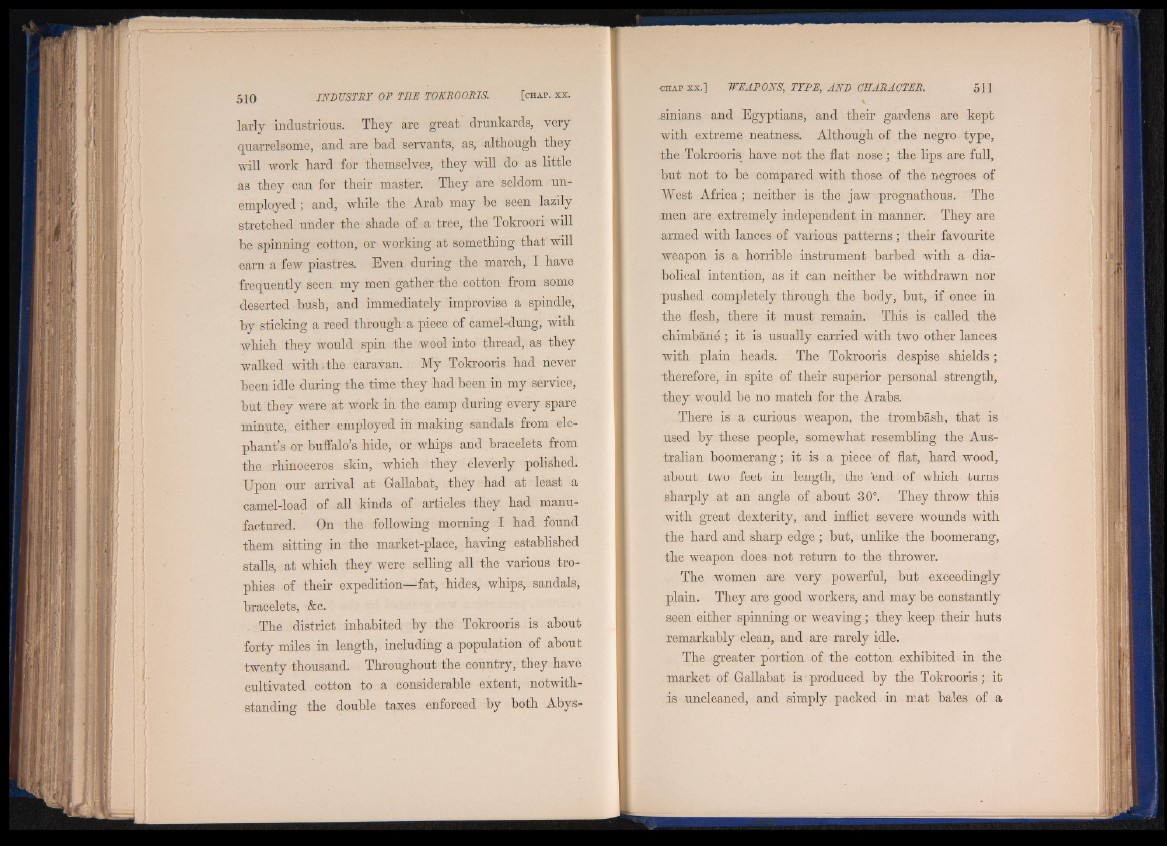
larly industrious. They are great drunkards, very
quarrelsome, and are bad servants, as, although they
will work hard for themselves, they will do as little
as they can for their master. They are seldom unemployed
; and, while the Arab may be seen lazily
stretched under the shade of a tree, the Tokroori will
be spinning cotton, or working at something that will
earn a few piastres.. Even during the march, I have
frequently seen my men gather the cotton from some
deserted bush, and immediately improvise a spindle,
by sticking a reed through a piece of camel-dung, with
which they would spin the wool into thread, as they
walked with .the caravan. My Tokrooris had never
been idle during the time they had been in my service,
but they were at work in the camp during every spare
minute, either employed in making sandals from elephant’s
or buffalo’s hide, or whips and bracelets from
the rhinoceros skin, which they cleverly polished.
Upon our arrival at Gallabat, they had at least a
camel-load of all kinds of articles they had manufactured.
On the following morning I had found
them sitting in the market-place, having established
stalls, at which they were selling all the various trophies
of their expedition—fat, hides, whips, sandals,
bracelets, &c.
The district inhabited by the Tokrooris is about
forty miles in length, including a population of about
twenty thousand. Throughout the country, they have
cultivated cotton to a considerable extent, notwithstanding
the double taxes enforced by both Abyssinians
and Egyptians, and their gardens are kept
with extreme neatness. Although of the negro type,
the Tokrooris^ have not the flat nose; the bps are full,
but not to be compared with those of the negroes of
"West Africa; neither is the jaw prognathous. The
men are extremely independent in manner. They are
armed with lances of various patterns; their favourite
weapon is a horrible instrument barbed with a diabolical
intention, as it can neither be withdrawn nor
pushed completely through the body, but, if once in
the flesh, there it must remain. This is called the
chimband ; it is usually carried with two other lances
with plain heads. The Tokrooris despise shields;
therefore, in spite of their superior personal strength,
they would be no match for the Arabs.
There is a curious weapon, the trombash, that is
used by these people, somewhat resembling the Australian
boomerang; it is a piece of flat, hardwood,
about two feet in length, the end of which turns
sharply at an angle of about 30°. They throw this
with great dexterity, and inflict severe wounds with
the hard and sharp edge ; but, unlike the boomerang,
the weapon does not return to the thrower.
The women are very powerful, but exceedingly
plain. They are good workers, and may be constantly
seen either spinning or weaving; they keep their huts
remarkably clean, and are rarely idle.
The greater portion of the cotton exhibited in the
market of Gallabat is produced by the Tokrooris; it
is uncleaned, and simply packed in mat bales of a